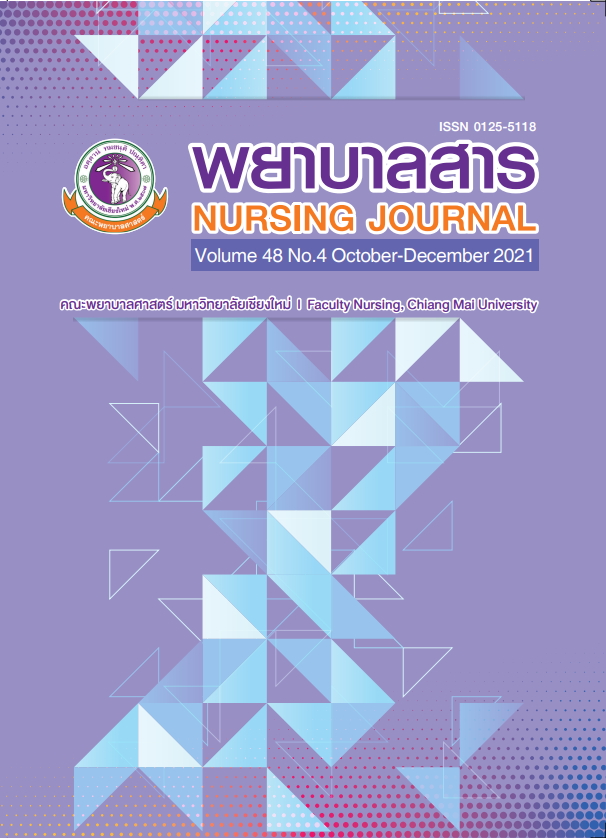Occupational Commitment and Subjective Career Success of Nurses in Tertiary Hospitals in Xishuangbanna City, the People's Republic of China
Keywords:
Occupational Commitment, Subjective Career Success, Nurses, Tertiary HospitalsAbstract
Subjective career success has positive effects on organizational productivity and previous research has found that occupational commitment is one of the factors related to the subjective career success of personnel. This descriptive correlational study aimed to explore occupational commitment and subjective career success and to examine the relationship between occupational commitment and the subjective career success of nurses. The participants included 367 nurses, stratified randomly selected from different nursing units of two tertiary hospitals in Xishuangbanna City, Yunnan Province, the People’s Republic of China. The research instruments consisted of the Nurse Occupational Commitment Questionnaire (NOCQ) and the Subjective Career Success Inventory (SCSI). The validity of these two instruments was confirmed by the authors using factor analysis. The reliabilities tested by Cronbach’s alpha coefficients for the NOCQ and the SCSI were 0.90 and 0.94, respectively. Descriptive statistics and Spearman’s rank correlation coefficient were used to analyze data.
The results revealed that:
1. The overall level of occupational commitment as perceived by nurses was high.
2. The overall level of subjective career success as perceived by nurses was moderate.
3. There was a moderate positive correlation between occupational commitment and subjective career success. There were moderate positive correlations between subjective career success and the four dimensions of occupational commitment: affective commitment, normative commitment, economic accumulated cost commitment and emotional accumulated cost commitment.
The results of this study provide valuable information for hospital and nurse administrators in raising awareness to enhance nurses' occupational commitment and assist nurses in achieving career success.
References
Abele, A. E., & Spurk, D. (2009). The longitudinal impact of self-efficacy and career goals on objective and subjective career success. Journal of Vocational Behavior, 74(1), 53-62.
Allen, T. D., Lentz, E., & Day, R. (2006). Career success outcomes associated with mentoring others: A comparison of mentors and non-mentors. Journal of Career Development, 32(3), 272-285.
Best, J. W., & Kahn, J. V. (2003). Descriptive studies: Assessment, evaluation, and research. Research in Education, 9(1), 114-158.
Brislin, R. W. (1980) Translation and content analysis of oral and written material.
In H. C. Triandis & J. W. Berry (Eds.), Handbook of cross-cultural psychology: Methodology. Boston: Allyn and Bacon.
Elmas-Atay, S. (2017). Work values fit and subjective career success: The moderating role of work engagement. International Review of Management and Marketing, 7(3), 113-120.
Han, F. P., & Wang, Z. W. (2017). The relationship between the working environment and the sense of career success of nurses in the emergency department. Chinese Nursing Management, 17(4), 511-515. (in Chinese)
Hu, Y. J., & Luo, Y. L. (2016). Reliability and validity of career success scale in infusion nursing specialists. Journal of Nursing (China), 32(19), 43-47. (in Chinese)
Jiang, Y., Zhang, Y. Q., & Wang, L. (2013). Correlations between turnover intention and occupational commitment among emergency nurses. PLA Journal of Nursing, 30(8), 28-30.
Karavardar, G. (2014). Career commitment, subjective career success and career satisfaction in the context of hazelnut processing industry in Giresun/Turkey. International Journal of Business and Management, 9(6), 98.
Mathieu, J. E., & Zajac, D. M. (1990). A review and meta-analysis of the antecedents, correlates, and consequences of organizational commitment. Psychological Bulletin, 108(2), 171.
Nogueras, D. J. (2006). Occupational commitment, education, and experience as a predictor of intent to leave the nursing profession. Nursing Economics, 24(2), 86.
Pei, Y. (2007). Study on occupational commitment level and influencing factors of turnover of nurses. Shanghai: Second military medical university. (in Chinese)
Poon, J. M. (2004). Career commitment and career success: Moderating role of emotion perception. Career Development International, 9(4), 374-390.
Ren, H., Wen, Z. L., & Chen, Q. S. (2013). The influence of psychological capital on the career success of enterprise employees: The mediating effect of occupational commitment. Journal of Psychological Science, 36(4), 960-964.
Shockley, K. M., Ureksoy, H., Rodopman, O. B., Poteat, L. F., & Dullaghan, T. R. (2016). Development of a new scale to measure subjective career success: A mixed methods study. Journal of Organizational Behavior, 37(1), 128-153.
Srikanth, P. B., & Israel, D. (2012). Career commitment & career success: Mediating role of career satisfaction. Indian Journal of Industrial Relations, 48, 137-149.
Wang, L., Tao, H., Ellenbecker, C. H., & Liu, X. (2012). Job satisfaction, occupational commitment and intent to stay among Chinese nurses: A cross-sectional questionnaire survey. Journal of Advanced Nursing, 68(3), 539-549.
Xu, J. J., Shang, L. P., & Luo, Z. L. (2010). Study on Impact of self-efficacy group guidance on nurses’ career condition. Nursing Management in China, 10(5), 30-34.
Yamane, T. (1973). Statistics: An introduction analysis. New York: Harper and Row.
Yang, S., Zhou, Y., & Yu, G. L. (2014). Research on career calling, career commitment and career success: Taking the “985” college female professors as an example. Research on Institutional Economics, 2014, 176-194. (in Chinese)
Downloads
Published
How to Cite
Issue
Section
License
บทความที่ได้รับการตีพิมพ์เป็นลิขสิทธิ์ของวารสารพยาบาลสาร
ข้อความที่ปรากฏในบทความแต่ละเรื่องในวารสารวิชาการเล่มนี้เป็นความคิดเห็นส่วนตัวของผู้เขียนแต่ละท่านไม่เกี่ยวข้องกับมหาวิทยาลัยเชียงใหม่ และคณาจารย์ท่านอื่นๆในมหาวิทยาลัยฯ แต่อย่างใด ความรับผิดชอบองค์ประกอบทั้งหมดของบทความแต่ละเรื่องเป็นของผู้เขียนแต่ละท่าน หากมีความผิดพลาดใด ๆ ผู้เขียนแต่ละท่านจะรับผิดชอบบทความของตนเองแต่ผู้เดียว






